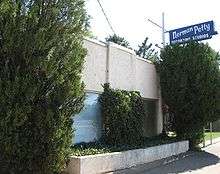Norman Petty
| Norman Petty | |
|---|---|
 Petty and his wife, Vi | |
| Background information | |
| Born |
May 25, 1927, Clovis, New Mexico, U.S. |
| Died |
August 15, 1984 (aged 57), Lubbock, Texas, U.S. |
| Occupation(s) | Musician, songwriter, record producer |
| Instruments | Hammond organ |
| Associated acts | Norman Petty Trio |


Norman Petty (May 25, 1927 – August 15, 1984) was an American musician and record producer who is best known for his association with Buddy Holly and the Crickets, who recorded in his studio.
Biography
Petty was born in the small town of Clovis, New Mexico, near the Texas border. He began playing piano at an early young age. While in high school, he regularly performd on a fifteen-minute show on a local radio station.
Petty and his wife, Vi, founded the Norman Petty Trio with the guitarist Jack Vaughn. They landed a recording contract and were voted Most Promising Group of 1954 by Cashbox magazine. In 1956, their major hit, "Mood Indigo", had sold a half million copies and enabled Petty to expand his recording studio considerably. In 1957, their song "Almost Paradise" hit number 18, and Petty won his first BMI writers award.
Despite the success of his own records, Petty is most famous for his recording studio in Clovis. In his homespun studio, he produced successful singles for his own musical group and for Texas musicians Roy Orbison, Buddy Knox, Waylon Jennings, Charlie "Sugartime" Phillips, Sonny West, Carolyn Hester, Terry Noland, Jimmy & Cliff Blakley, and Buddy Holly.[1] "Sugar Shack" and "Bottle of Wine" by Jimmy Gilmer and the Fireballs and "Wheels" by the String-A-Longs were recorded at Petty's studio. Petty produced a number of Canadian recording artists, including Wes Dakus & the Rebels, Barry Allen, Gainsborough Gallery, and the Happy Feeling, all which had chart success in their homeland. Throughout the 1950s and 1960s, recordings produced by Petty, in various musical styles, were issued by virtually every major record label in the United States and Canada, with numerous regional successes.
Petty served as Buddy Holly's recording engineer and also as his first manager until late 1958. Many of Holly's best and most polished efforts were produced at the Clovis studio. After Holly's death, Petty was put in charge of overdubbing unfinished Holly recordings and demos. He was hired because he had access to the local musicians that Holly had worked with over the course of his short career, most of whom would not be able to spend time in a professional studio in New York City.
Petty purchased the Mesa Theater on Main Street in Clovis in 1960. In 1963, he launched the FM radio station KTQM starting as an easy-listening station, later switching to country-and-western music, and then in 1968 to Top 40 rock. The country genre had local appeal, so he applied for a new station license and started KWKA 680 AM in 1971, airing country-and-western music. Petty ran both stations until 1979. The stations were sold by Curry County Broadcasting to Zia Broadcasting in 2010.
Petty died in Lubbock, Texas, in August 1984, of leukemia. Later in 1984 he was posthumously named Clovis Citizen of the Year. His wife, Vi, died in March 1992. She helped start the "Norman and Vi Petty Music Festival" in Clovis in 1987, which ran until her death in 1991. It featured many artists who had recorded at the Clovis studio and also popular hitmakers. Robert Linville requested the name from the Chamber and started the festivals again from 1998 until his death in 2001.
Norman and Vi were given awards for "Outstanding Graduate Accomplishment" (in the classes of 1945 and 1946, respectively) by the Clovis Municipal Schools Foundation and Alumni Association in April 2011. The awards are presented to Clovis High School graduates for achievement in their sphere of business; the recipients are chosen because their strength of character and citizenship, to serve as models for today’s CHS students. The plaques were given to Vi's relative Nick Brady, who turned them over to Kenneth Broad of the Petty estate to display during studio tours. The original 7th Street Studio is available for tours by appointment only.
The King of Clovis, a book about Petty by Frank Blanas, was published in 2014. A documentary is also in the works from the Super Oldies label.
Petty's Nor-Va-Jak record label was revived in 2014, with authorization from Norman Petty Studios, for the purpose of reissuing Petty productions that were not previously available on CD.
Songwriting credits
Petty gave himself songwriting credits on some of Buddy Holly's songs and songs by other artists.[2][3] This had been a common practice for decades, especially among managers and label owners (Irving Mills and Morris Levy being perhaps the best-known examples). Petty briefly did this in the late 1950s, as he had been told it was the norm in publishing, but he discontinued this practice within a few years.
See also
References
- ↑ "Show 12, Big Rock Candy Mountain: Rock 'n' Roll in the Late Fifties. [Part 2] : UNT Digital Library". Digital.library.unt.edu. 1969-04-27. Retrieved 2010-09-02.
- ↑ Amburn, Ellis. Buddy Holly: A Biography.
- ↑ Lehmer, Larry. The Day The Music Died.
External links
- "Norman Petty Studios: Official Website"
- "Nor-Va-Jak Music". Authorized CDs of Petty Productions, discography, info
- "Almost Paradise: The Definitive History". DVD documentary
- "Norman Petty Studios/Nor-Va-Jak Music" on Facebook
- "Norman Petty". Rockabillyhall.com. 1997-03-21. Retrieved 2010-09-02.
- Pore-Lee-Dunn Productions. "Interview with the Fireballs". Classicbands.com. Retrieved 2010-09-02.
- "Interview with Norman Petty". Songwriter magazine, International Songwriters Association
- "Norman Petty Interview" on Pop Chronicles (recorded April 1968)
- BMI entry of songs credited or co-credited to Petty